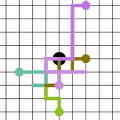In this research, we investigate the barriers associated with implementing Federated Learning (FL) in real-world scenarios, where a consistent connection between the central server and all clients cannot be maintained, and data distribution is heterogeneous. To address these challenges, we focus on mobilizing the federated setting, where the server moves between groups of adjacent clients to learn local models. Specifically, we propose a new algorithm, Random Walk Stochastic Alternating Direction Method of Multipliers (RWSADMM), capable of adapting to dynamic and ad-hoc network conditions as long as a sufficient number of connected clients are available for model training. In RWSADMM, the server walks randomly toward a group of clients. It formulates local proximity among adjacent clients based on hard inequality constraints instead of consensus updates to address data heterogeneity. Our proposed method is convergent, reduces communication costs, and enhances scalability by reducing the number of clients the central server needs to communicate with.
翻译:暂无翻译




